Thousands of workers marched on February 8 in Caracas calling for the nationalisation of Sanitarios Maracay, CANTV, Caracas Electricity, Sidor and other companies.
The march was a complete success and showed the enormous potential of the Venezuelan working class. Thousands of workers (around 6,000) in an enthusiastic and confident mood, flooded the centre of Caracas demanding the nationalisation of Sanitarios Maracay and supporting the call for the nationalisation of CANTV, Caracas Electricity and of Orinco. Not only that, but workers of several other companies joined the march in a mobilisation that places the working class at the forefront of the movement. This march also demonstrated that unity in action of the different sectors of the UNT, which have been in conflict for the last few months, is possible.
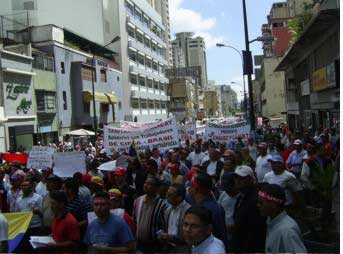 The workers of Sanitarios Maracay and CCURA, headed by Orlando Chirinos, called for the march to begin at the Carabobo Industrial Park. A few hundred metres away at the Plaza Morelos, another group of workers from the electricity companies and other unions had been convened by the FBT (Fuerza Bolivariana de Trabajadores - Bolivarian Workers' Force), now called the FsBT (Fuerza socialista Bolivariana de Trabajadores - Socialist Bolivarian Workers' Force). In the end the march left the Plaza Morelos and reached the workers of Sanitarios Maracay and other unions of the state of Aragua at the Carabobo Industrial Park. The march headed to the National Assembly without incident and in a festive mood, where they handed in a petition. They then headed to the office of the Vice-Presidency of the Republic at Miraflores where some representatives of the workers met and presented their demands. Among the representatives of the UNT were Orlando Chirino, José Mora, Joaquín Osorio, Stalin Pérez, Rubén Linares, José Bodas, José Meléndez.
The workers of Sanitarios Maracay and CCURA, headed by Orlando Chirinos, called for the march to begin at the Carabobo Industrial Park. A few hundred metres away at the Plaza Morelos, another group of workers from the electricity companies and other unions had been convened by the FBT (Fuerza Bolivariana de Trabajadores - Bolivarian Workers' Force), now called the FsBT (Fuerza socialista Bolivariana de Trabajadores - Socialist Bolivarian Workers' Force). In the end the march left the Plaza Morelos and reached the workers of Sanitarios Maracay and other unions of the state of Aragua at the Carabobo Industrial Park. The march headed to the National Assembly without incident and in a festive mood, where they handed in a petition. They then headed to the office of the Vice-Presidency of the Republic at Miraflores where some representatives of the workers met and presented their demands. Among the representatives of the UNT were Orlando Chirino, José Mora, Joaquín Osorio, Stalin Pérez, Rubén Linares, José Bodas, José Meléndez.
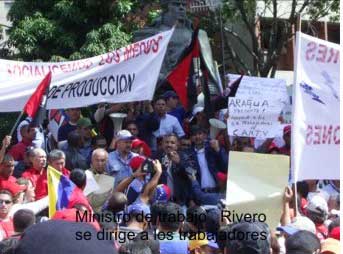 The workers of Sanitarios Maracay headed this historic march of 800 workers and their families, and they were joined by hundreds of workers in UNT unions in Aragua such as Nestle, Cervecería Regional among others, demanding the nationalisation of the factory. There were placards calling for the nationalisation of Sidor, Aeropostal, and the route of the demonstration was plastered with posters, and there were the hundreds of posters the workers carried in their hands. The presence of workers from FRETECO (The Revolution Front of Occupied Factories) must be emphasised. There were workers from the occupied factories such as INVEVAL, INVETEX, sacked workers from INVEPAL Maracay. The workers from INVEPAL were unable to make it due to transport problems.
The workers of Sanitarios Maracay headed this historic march of 800 workers and their families, and they were joined by hundreds of workers in UNT unions in Aragua such as Nestle, Cervecería Regional among others, demanding the nationalisation of the factory. There were placards calling for the nationalisation of Sidor, Aeropostal, and the route of the demonstration was plastered with posters, and there were the hundreds of posters the workers carried in their hands. The presence of workers from FRETECO (The Revolution Front of Occupied Factories) must be emphasised. There were workers from the occupied factories such as INVEVAL, INVETEX, sacked workers from INVEPAL Maracay. The workers from INVEPAL were unable to make it due to transport problems.
An example of the attitude of the Bolivarian government towards the question of nationalisations was the presence of the Minister of Labour, José Ramón Rivero, on the march. Rivero, a former trade unionist from Guayana, supported fully the call for the nationalisation of these companies in an intervention he made at the start of the march at the Plaza Morelos, and reiterated the support of the working class. "I come from the trade union movement, and I am here as a Minister of this Revolution." At the same time he explained that Chavez was aware of his presence on the march and that he was also on the side of the workers.
The working class enters the scene
This march on February 8 revealed the same process, but on a higher level to that which took place in October, November, and December 2004 and the first three months of 2005 - that is that the working class has entered the scene in an organised way at the forefront of the revolution.
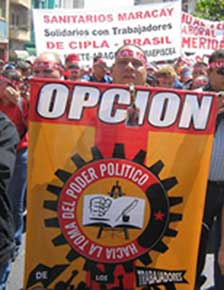 The last three months of 2004 were characterised by the enormous expectations raised within the revolutionary movement by the victory in the recall referendum and the victory in the mayoral and gubernatorial elections. At that time the revolutionary movement took up the idea of the "revolution within the revolution", as President Chavez had coined it, and also the "deepening of the revolution". The struggle of the Venepal workers took place in the context of a shift to the left in the revolution. The struggle against the closure of the paper mill and for its expropriation was one of the central axes of the Venezuelan workers' movement during those months. In January 2005 President Chavez announced the expropriation of the company under workers' control. This was followed by the CNV in April 2005 along with a whole series of companies that form part of the process called revolutionary cogestión (co-management).
The last three months of 2004 were characterised by the enormous expectations raised within the revolutionary movement by the victory in the recall referendum and the victory in the mayoral and gubernatorial elections. At that time the revolutionary movement took up the idea of the "revolution within the revolution", as President Chavez had coined it, and also the "deepening of the revolution". The struggle of the Venepal workers took place in the context of a shift to the left in the revolution. The struggle against the closure of the paper mill and for its expropriation was one of the central axes of the Venezuelan workers' movement during those months. In January 2005 President Chavez announced the expropriation of the company under workers' control. This was followed by the CNV in April 2005 along with a whole series of companies that form part of the process called revolutionary cogestión (co-management).
It was in January 2005, in the heat of the struggle at Venepal, that President Chavez began to speak about socialism and the fact that it was the way forward for the Bolivarian Revolution against capitalism. At the same time the expropriations and the debate about socialism pushed the movement forward, driven by the expectations that were being generated.
This all culminated in the massive march on May 1, 2005, where the question of expropriation and workers' cogestión were central to the mobilization of tens of thousands of workers on the streets of Caracas.
Now in February 2007 we see the same phenomenon but on a higher level. The electoral victory on December 3 raised enormous expectations within the revolutionary movement, while at the same time Chavez's proposals (nationalisations, the formation of the USPV, the Enabling Law, etc.) over the last few weeks have increased these expectations even more. There is the struggle of the workers of Sanitarios Maracay which culminated in the occupation of the factory on November 14, the introduction of workers' control and the starting up of production. This struggle, as the march on February 8 showed, is having a big impact on the Venezuelan workers' movement. The struggle at Sanitarios Maracay can be compared to the struggle at Venepal in 2004, but on a higher level. At Venepal the workers did not manage to start producing before the expropriation of the factory. They did not have the level of organisation, nor the opportunity to be politically prepared for the occupation of the factory, things which the workers at Sanitarios had. What's more, the struggle at Sanitarios Maracy is taking place in the heartland of the most important industrial area of the country, Aragua-Carabobo.
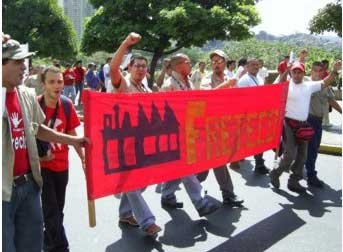 In that sense, similar to 2005 where Chavez's call for socialism and the expropriation of Venepal and CNV galvanized the workers' movement, today it is the nationalisation of CANTV, Caracas Electricity, and Orinoco, the drive towards socialism and the formation of the USPV that is galvanising them. The CMR [Revolutionary Marxist Current] welcomes these measures, which are enormously positive for the working class in Venezuela and internationally, as a great step forward. After almost two decades of privatisations and the offensive of the bourgeoisie against the workers around the world, these nationalisations in Venezuela mark a new epoch in Venezuela, in Latin America and the world.
In that sense, similar to 2005 where Chavez's call for socialism and the expropriation of Venepal and CNV galvanized the workers' movement, today it is the nationalisation of CANTV, Caracas Electricity, and Orinoco, the drive towards socialism and the formation of the USPV that is galvanising them. The CMR [Revolutionary Marxist Current] welcomes these measures, which are enormously positive for the working class in Venezuela and internationally, as a great step forward. After almost two decades of privatisations and the offensive of the bourgeoisie against the workers around the world, these nationalisations in Venezuela mark a new epoch in Venezuela, in Latin America and the world.
But these measures called for by Chavez can only be seen as the beginning. The Bolivarian government must spread the nationalisations to the rest of the economy, to the key sectors of basic industry and manufacturing in order to democratically plan the economy and satisfy the needs of the population in the face of the anarchy and sabotage of the capitalists. The participation of the working class is fundamental if this is to be carried out. The working class is the only section of the population, allied with the neighbourhood communities, the peasants and the poor, that is capable of democratically managing a nationalised planned economy. The bureaucratic management of a socialist economy can only lead to disaster, as was the case in the Soviet Union with the bureaucratic degeneration of the revolution after the death of Lenin, which amongst many other things, Chavez has emphasized.
The question of the state
One of the main tasks the Bolivarian Revolution must be to resolve us the question of the state and the bureaucracy. The current state apparatus is a bourgeois state apparatus - but it is a peculiar bourgeois state in the sense that the bourgeois has lost direct control over it. It continues to be a bourgeois state in the sense that it is a state apparatus created to reproduce and maintain the class divisions and to benefit the ruling class, i.e. the capitalist oligarchy which has control of production and banking in the country. The state is an instrument developed in order to maintain the class division of society, while at the same time it is generated by the fact that society is divided into classes.
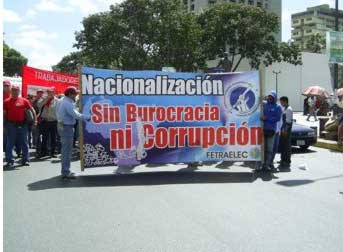 President Chavez will run into two obstacles in carrying out these measures in favour of the people: the private ownership of the means of production, agriculture, textile, basic consumption, etc. and the obstacle of the bourgeois state inherited from the IV Republic. In this sense, the Enabling Law which was recently passed in the National Assembly and which provides Chavez with the legal authority to pass laws by decree in a series of fields, is an attempt on the part of Chavez to overcome the slowness and inefficiency of the state apparatus in the execution and development of the measures required for the advance of the revolution. The bourgeois state in Venezuela is a hindrance from the past that threatens both the present and future of the revolution.
President Chavez will run into two obstacles in carrying out these measures in favour of the people: the private ownership of the means of production, agriculture, textile, basic consumption, etc. and the obstacle of the bourgeois state inherited from the IV Republic. In this sense, the Enabling Law which was recently passed in the National Assembly and which provides Chavez with the legal authority to pass laws by decree in a series of fields, is an attempt on the part of Chavez to overcome the slowness and inefficiency of the state apparatus in the execution and development of the measures required for the advance of the revolution. The bourgeois state in Venezuela is a hindrance from the past that threatens both the present and future of the revolution.
However, one single man cannot take the revolution to socialism on the basis of good intentions and the many laws that he decrees. The working class must be mobilised. The conscious action of the proletariat is required in order to place itself at the forefront of the revolution and so that it can begin to organise society on a new basis. If this does not occur, any progressive measures taken by the revolution can be reversed. A clear example of this is the development of the process of expropriations and co-management in 2005 and 2006.
Because the leadership of the UNT did not take up the call of the government to occupy factories issued by Chavez in July 2005 - and then again by Maria Cristina Iglesias, the Minister of Light Industry and Trade, - at the Latin American Gathering of Occupied Factories, the movement for expropriations and workers' control remain completely isolated. As a result, the state bureaucracy, which, as Lenin said, is tied by a thousand threads, both visible and invisible, to the bourgeoisie, turns the whole process into its opposite. At Invepal a whole series of conflicts between the state bureaucracy and the workers erupted, which led to the intervention of the government and the end of workers' control at the end of 2006. Thus, at the end of 2006 the only expropriated company in Venezuela to be producing under workers' control was Inveval, and this was thanks to the enormous effort and patience on the part of the workers who suffered a delay of more than one year since its expropriation. In the other factories, thousands of bureaucratic obstacles paralysed their functioning or the implementation of workers' control, or both. The state bureaucracy inherited from the IV Republic is just as responsible for this state of affairs as the bureaucracy which has arisen under the V Republic. The proposals for expropriations and co-management made by Chavez become dissolved and lost within the state apparatus, which attempts to reverse them.
It is possible to re-unite the UNT on the basis of a united struggle of the working class for the expropriation of the capitalists. Not one Sanitarios Maracay, but hundreds and thousands!
In 2007 the Venezuelan Revolution is facing an excellent opportunity in which the leadership of the various currents of the UNT can learn the lessons of the errors made over the last few years, and in which they can galvanise the potential of the working class towards the socialist revolution, i.e. towards the expropriation of the capitalists, the dismantling of the bourgeois state and the establishment of a revolutionary state at the forefront of which will be the working class. The central task of the UNT at this time is to spread the occupation of factories under workers' control. Again, what is required is not just one Sanitarios Maracay, but hundreds and thousands of such struggles. As was demonstrated in the march on February 8, the working class is in the mood and has the intention and willingness to do this. This includes the Bolivarian government, which sent the Minister of Labour to the march, with the approval of President Chavez. In what other country in the world does the government send a minister in support of a march in favour of the nationalisation of companies? The Venezuelan workers do not lack the desire or the courage, but only a plan of action for the revolutionary expropriation of the capitalists from below.
In the first place, following the example of Sanitarios Maracay, the workers of CANTV, Sidor, Aeropostal and other workplaces in conflict or that are demanding nationalisation, do not have to wait for the government to expropriate the company, by must rather elect factory committees to exercise workers' control over production, as a first step towards the workers' management of the company.
Factory committees must be formed in all public and private companies so that the workers can exercise control over production.
The UNT should launch a national campaign for the extension of the factory committees to all companies in the country, both nationalised and private, in order to establish workers' control of production. Regarding the role of the factory committees, there are sectors inside the UNT that fear the extension of the factory committees. Mistakenly, they have argued that the committees would weaken the trade union organisation of the workers and weaken the UNT itself. We must ask these comrades a question: Didn't the factory committee elected at Sanitarios Maracay by the assembly of the workers serve to strengthen the union? Of course it did. There is no contradiction between the union of a company and the factory committee, but rather they complement one another, as the experience at Sanitarios Maracay amply demonstrates.
The debate over the elections has paralysed the workers' movement
The February 8 march showed that it is possible to unite the UNT. Two wings which are in conflict, the CCURA and the FBT, marched together in the streets of Caracas for the nationalisation of Sanitarios Maracay, CANTV, Caracas Electricity, Sidor and other companies. The CMR has argued that the unity of the UNT is only possible on the basis of unity in struggle, unity in action. We must follow this path.
For a national day of factory occupations!
The UNT must massively organise the taking and occupation of companies throughout Venezuela. This can be made concrete in a national day of occupations. To do this is it necessary to prepare it in advance with a special conference of the UNT to discuss socialism, the occupation of factories and workers' control in which all the sectors of the union participate in and organise the struggle. At the same time this conference should elect a provisional coordinating body of struggle, which would organise this national day of occupations. On this basis it would be possible to unite the UNT. If this is done, within a few months the conditions would emerge for holding elections in the UNT, but this time on the basis of a leadership which has won the right to lead in the struggle, which is recognised by the workers, and on the basis of an enormous advance of the Venezuelan working class in the direction of socialism.
All of this depends on the leadership of the UNT. The power to not repeat the errors of 2005 and 2006 rests in the hands of the UNT. The UNT has the ability to make 2007 the year of the socialist revolution in Venezuela with the ascent of the working class to the forefront of the revolution. If this takes place, the march of February 8 will have marked the beginning of a historical year.
See a picture gallery of the demonstration here.
- The Enabling Law in Venezuela – a class point of view by Patrick Larsen (February 5, 2007)
- Why Aren't You in a Hurry, Comrade? by Michael A. Lebowitz - Monthly Review (Febryary 2, 2007)
- Venezuela: The real meaning of “Fatherland, socialism or death” by Pablo Roldan (February 1, 2007)
- Venezuela: Five planks in building socialism, workers’ councils and the role of the working class by Luis Primo (January 23, 2007)
- There can be no democracy while the media remain in capitalist hands by Fernando Buen Abad Domínguez (January 15, 2007)
- “What is the problem? I am also a Trotskyist!” - Chavez is sworn in as president of Venezuela by Jorge Martin (January 12, 2007)
- Chavez announces radical measures against capitalism in Venezuela by Fred Weston (January 9, 2007)
- Chavez announces United Socialist Party of Venezuela by Jorge Martin (December 20, 2006)
- The struggle at Sanitarios Maracay is key for the socialist future of the Bolivarian Revolution (December 13, 2006)
